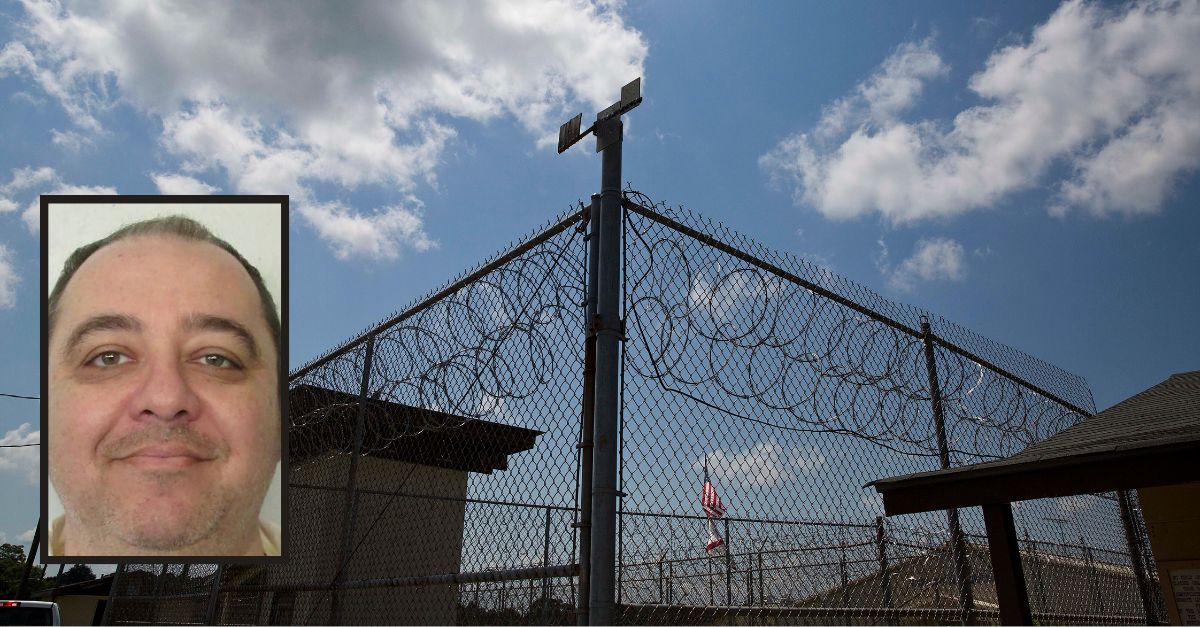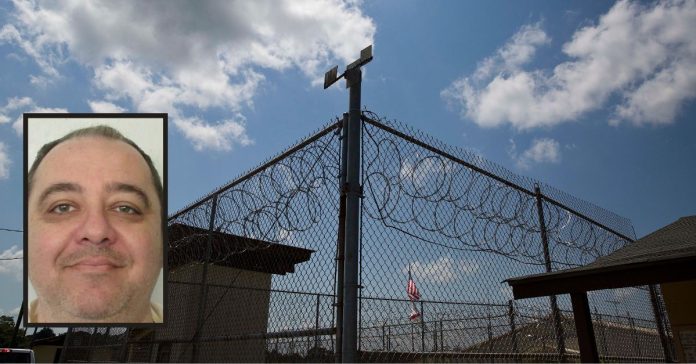
This undated photo provided by the Alabama Department of Corrections shows inmate Kenneth Eugene Smith, who was convicted in a 1988 murder-for-hire slaying of a preacher’s wife. (Alabama Department of Corrections via AP, File)
The state of Alabama will attempt to put a man to death on January 25, 2024, by nitrogen hypoxia, a method that forces a person to breathe in nitrogen gas until they are dead. It would be a first for the United States.
Alabama Governor Kay Ivey made the announcement Wednesday stating that the method is scheduled to be used for Kenneth Smith, 58, a man convicted of killing a reverend’s wife in a murder-for-hire plot in 1988.
According to the Death Penalty Information Center, condemned inmates will “be put to death by suffocation as they are forced to breathe pure nitrogen gas … which will slowly deprive them of oxygen.”
Elizabeth Sennett was stabbed in the chest eight times and once in her neck in her Alabama home that March.
Coroners, according to court records, said there were cuts and abrasions all over her body. At trial, it was established that Sennett’s husband Charles Sennett Sr., a minister in Colbert County, Alabama, had recruited men to do the deed: Billy Gray Williams, John Forest Parker and Kenneth Smith.
Smith was meant to be executed by lethal injection last November but intravenous lines needed for the procedure could not be connected to him properly.
The botched execution prompted a lawsuit from Smith against the Alabama Department of Corrections.
Smith said he was left on the execution gurney for four hours in agony as state prosecutors worked to lift a stay of execution that the state’s federal appeals court had put in place before.
It was widely reported that prison officials said Smith’s execution was called off because they were unable to start the lethal injection process inside of a 100-minute window between the court approving the execution to begin and a midnight deadline when the order for Smith’s death officially expired.
It was roughly two hours before midnight when the U.S. Supreme Court lifted a stay issued earlier that same evening by an appellate court. Alabama state officials, however waited another hour to decide whether or not Smith would be executed by lethal injection.
“Some three decades ago, a promise was made to the victim’s family that justice would be served through a lawfully imposed death sentence … Although that justice could not be carried out tonight because of last minute legal attempts to delay or cancel the execution, attempting it was the right thing to do,” Governor Ivey said last November, the Associated Press reported.
According to court exhibits, testimony at the trial more than 30 years ago suggested the reverend was having an affair and was deep in debt. A week after his wife was killed, he had taken out a substantial insurance policy on her and when police started asking Sennett questions as an investigation into her death mounted, the reverend killed himself.
Smith has denied ever stabbing Sennett’s wife. He told police in 1988 that roughly a month before Elizabeth was murdered, Billy Gray Williams — his “good friend,” he said — made the fateful offer to him one night as they sat on his porch. Prosecutors said Charles Sennett tapped Williams for the murder and Williams turned to Smith and Parker to do the job.
Smith told police he expected to be paid $1,000 for the killing and that when he spoke to the reverend directly after a previous meeting with Williams, the reverend told him to make it “look like a burglary went bad.”
Smith told police he got inside the reverend’s home while his wife was there alone simply by knocking on the door and telling her that her husband said they could do some hunting on the property.
Court records show Sennett called her husband for permission to let them in. He obliged.
Smith told police he and Parker lurked around the property for a few minutes before asking to use the bathroom. It was the final courtesy Elizabeth Sennett ever extended to another human being.
As she sat in her den moments later, prosecutors said, the men attacked her.
Smith claimed it was John Parker who “went into a frenzy” and hit her with a large cane and “anything else he could get his hands on.” He told police that he left Parker to the grisly work as he scrambled to throw the house in disarray and do as the reverend commanded to make it look like a robbery.
In a statement to police, Kenneth Smith recounted the day:
“The last place I saw Mrs. Sennett she was lying near the fireplace covered with some kind of blanket. I had gone outside to look in the storage buildings when I saw John run out to the pond and throw some things in it. I also took a small stereo from the house … the VCR was a Samsung. I got it from under the TV set in the den. When John got back to the car we drove back to Billy’s apartment to get our money. On the way back John told me that he had stabbed her once in the neck. I never stabbed Mrs. Sennett at all. When John and I got to Billy’s, we were given $900 a piece. Billy gave us the money. At the time of the murder I never [knew] Charles Sennett’s name or his wife’s. It was only when it came out in the newspaper that I learned the name of the lady that was killed and Charles Sennett. I took the Samsung VCR home with me. The last time I saw the stereo it was in John’s car.”
Smith’s denial of stabbing Elizabeth Sennett “minimized his role,” Assistant Attorney General Richard Anderson wrote in August in the state’s motion to set Smith’s execution date.
Sennett was tried twice and convicted twice. In 1996, CNN reported, jurors voted 11-1 in favor of life in prison over capital punishment but the judge overrode the jury.
According to NPR, a spokesperson for the Alabama governor’s office said Smith requested the new execution method as an alternative to lethal injection.
When suing to stop the execution, Smith’s attorneys have called the nitrogen gas method “novel and experimental” and something they are unwilling to make their client a “test subject” for.
“Like the eleven jurors who did not believe Mr. Smith should be executed, we remain hopeful that those who review this case will see that a second attempt to execute Mr. Smith — this time with an experimental, never-before-used method and with a protocol that has never been fully disclosed to him or his counsel — is unwarranted and unjust,” Smith’s attorney Robert Grass told the Associated Press on Thursday.
Alabama’s execution protocol notes that the way in which masks are fitted to a person’s face for execution by nitrogen gas note leaves open the possibility of the “unlikely event” that the hose supplying the deadly gas could become detached, potentially exposing spiritual advisors and prison staff also in the execution chamber.
The Death Penalty Information Center notes that in the last decade, only three states have approved the use of nitrogen gas for executions: Alabama, Oklahoma and Mississippi.
When Smith’s execution by lethal injection was botched in November 2022, it was the second time such an incident had occurred in as many months and the third time overall since 2018.
When administered, the gas is expected to kill the person inhaling it within 5 to 15 minutes, according to the state’s execution protocol.
Accomplice John Parker was executed for his role in Sennett’s killing in 2010 by lethal injection.
Have a tip we should know? [email protected]

